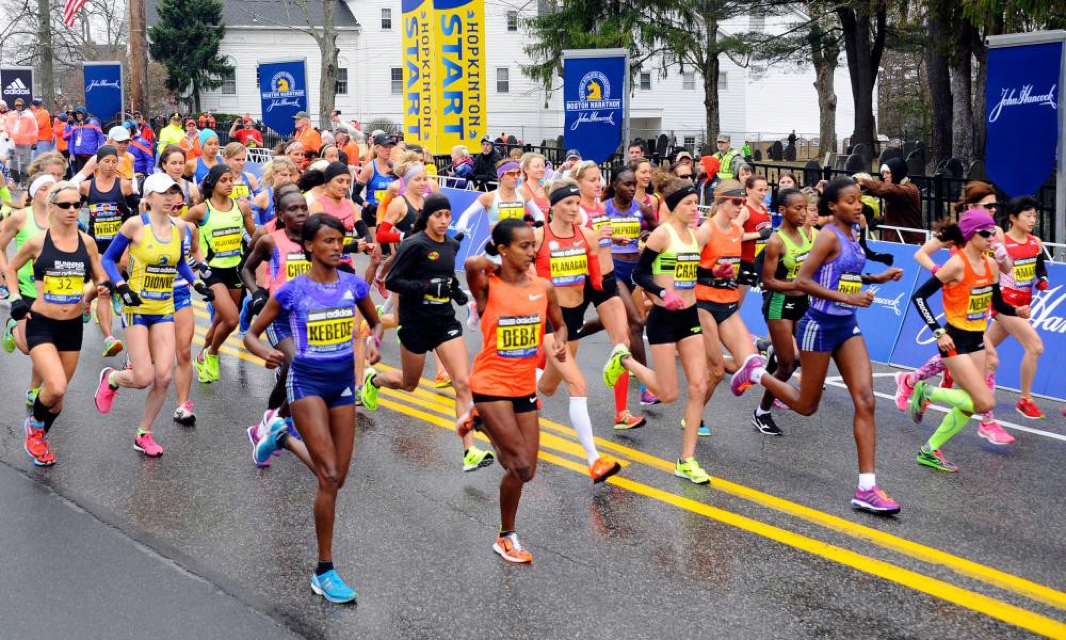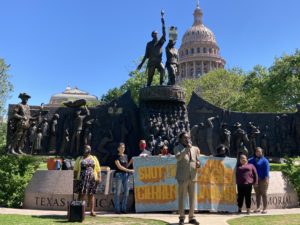The Boston Marathon is taking steps to ensure unsung Black and brown running heroes will receive overdue recognition and runners of color will feel more welcome to the community
As Beantown prepares for its globally followed annual signature event on Monday, spectators and runners may notice the Boston Marathon pushing past a new kind of wall.
The change with the oldest contested marathon in the world is made even more dramatic by the race’s return to a live event after a two-and-a-half-year pandemic hiatus.
Friday’s opening ceremony recognized 12 organizations welcoming runners of color, including Black Men Run and Black Girls Run, and announced a collective $125,000 in grants to groups doing what they say Boston’s running clubs have not: welcomed Black and brown runners and would-be runners. The ceremony also honored late two-time Boston winner Ellison “Tarzan” Brown, a Native-American runner largely unsung. On Sunday, the National Black Marathoners Association (NBMA) will announce a major project funded largely by the Boston Athletic Association (BAA), the marathon’s parent organization. And banners on the course for Monday’s race that winds from Hopkinton, Massachusetts, toward Copley Square downtown will celebrate Indigenous Peoples’ Day, known to some as Columbus Day.
A marathon official says the BAA has been putting in the work to boost outreach and diversity.
“We took time during the pandemic to strengthen relationships because we wanted to be more intentional,” said Suzanne Jones Walmsley, the BAA’s director of youth and community engagement, whose position was created in 2014 to build better ties with metro Boston’s Black and brown communities.
The running organization has created the Boston Running Collaborative, a coalition between the BAA and running organizations focused on runners of color. The collaborative will open up ties to communities who feel locked out of the sport. The group is in its beginning stages and still feeling its way, Jones Walmsley said.
She told the Guardian that the BAA was further motivated to improve outreach by the February 2020 death of Ahmaud Arbery, an unarmed Black Georgia man fatally shot while out for a run, and the May 2020 murder of George Floyd, an unarmed Black Minneapolis man who died under the knee of a since-convicted police officer. Both cases galvanized protesters because of their magnifying glass on domestic racism.
The Arbery case, specifically, opened up discussions on the part of Black runners who said they often feel unsafe and are looked upon with suspicion.
“It gives you that renewed focus, especially when you look at Arbery, who was a runner,” Jones Walmbley said. “It was a real wake-up call. It helped us move a little faster.”
The changes are significant not just for the broader running community but also for society, given Boston’s reputation – deserving or not – as a racist town. They mean that unsung Black and brown running heroes will receive the recognition that has eluded them and runners of color will feel more welcome to the running community. Because the marathon is such a strong part of Boston’s identity, the race changes could have an effect on Boston’s reputation too.
Certainly, Black people have made notable strides in the city of 684,000 and its suburbs. But history shows Boston has had a problem with race. In 1641, Massachusetts became the first colony to legalize slavery. From 1974 to 1976, white Bostonians reacted violently to federal orders for the schools to desegregate and drew national attention to the city’s racial divisions. In 1989, the late Charles Stuart, a white man, attracted more negative attention to the city when he blamed the murder of his wife on a fictitious Black man.
There are running anecdotes, too. The late Ted Corbitt, a Black Olympian, pioneer in running-course measurement and founding president of New York Road Runners (parent organization to the TCS New York City Marathon), was called the N-word while attending a Road Runners Club of America conference in the late 1960s in Boston, according to his son, historian Gary Corbitt. In 2013, the year of the Boston Marathon bombing, Olympian and Boston Marathon winner Meb Keflezighi, an Eritrean American, was a spectator. When he tried to fly home to San Diego, Homeland Security staffers began grilling him. He was saved by some fans who interrupted to get his autograph.
Even in recent years, the marketing and events surrounding the race included little that would make runners of color feel acknowledged, said Dr Tiffany Gayle Chenault, a Black runner, sociology professor and co-ambassador for Boston’s Black Girls Run chapter.
“Every year you go through the city and there are these placards (with the marathon logo on them) – you don’t see people of color on them – it’s always white men and white women,” said Chenault, 47, who lives in Boston. “They’ll have the disabled athletes and it’s still white. They’ll have couples running together, holding hands. It’s still white,” she said.
“It’s as if we are other,” Chenault said. “And for so many people in certain neighborhoods, predominantly Black neighborhoods, it’s like, ‘The Boston Marathon is coming.’ Big deal.”
Chenault and other running leaders of color said they are glad to see the BAA’s progress. Anthony Reed, cofounder of the 17-year-old National Black Marathoners Association, said his relationship with the running organization has strengthened. “It’s almost like two people dating each other,” Reed said. “It takes time to really get to know and understand the person or organization.”
During its annual Boston Marathon meetup this Sunday, the NBMA will announce a documentary in post production titled Breaking Three Hours that introduces the public to nine unsung Black women distance champions. Reed, 66, of Dallas, and a veteran of 131 marathons, said the BAA is a major sponsor.
“I pitched the documentary to them,” Reed recalled. “They said five minutes into the presentation, ‘We’ve looked over all the documentation, the storyboard for your proposal and we want to support you,’ “
There is more positive movement as well. The BAA and the Black running community have teamed up with the Dimock Center, a health center in the majority Black neighborhood of Roxbury, to produce the seventh annual Road to Wellness 5K.
Advocates for runners of color say they will make sure the change continues to happen.
“The BAA has been progressive and I sense that they, the leadership, will do the right thing about preserving the history – I’ve had their support,” said Gary Corbitt, 70, of Jacksonville, Florida, who has worked with the organization in preserving his father’s legacy.
“We’ve got to hold everybody’s feet to the fire,” Corbitt said.




